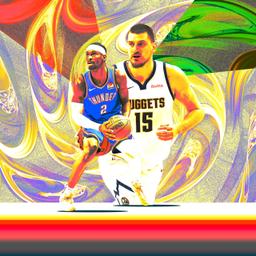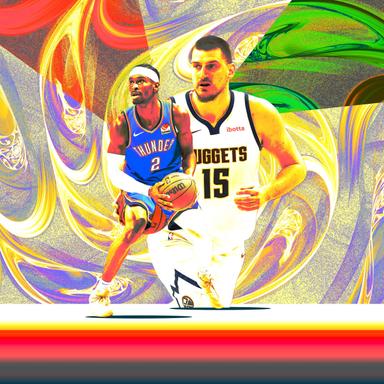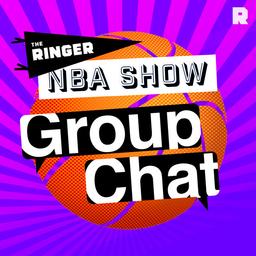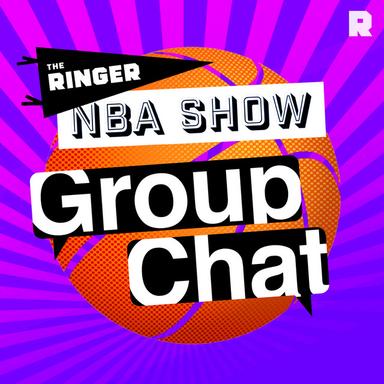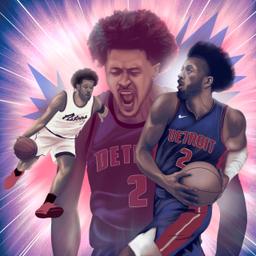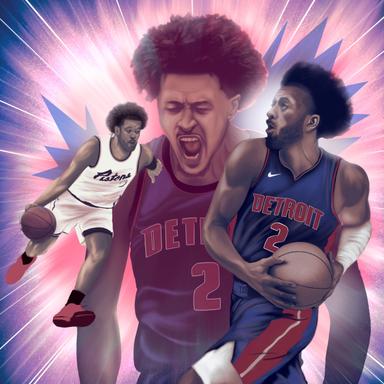It’s awards season! The time of year when countless hours spent watching League Pass, taking copious notes, talking to and texting people in and around the NBA, and then scrolling through various statistically rich websites in an effort to interpret all the action finally pay off!
I love filling out an awards ballot, meticulously commemorating the players who best embody what makes NBA basketball so enjoyable, compelling, and fierce. I’m lucky enough to have an official vote, and what you read in this story (minus the caveats mentioned below) is who I selected in each category.
OK, now the first caveat: In this article, I diverge from the NBA’s games-played restriction by ignoring the part where appearances that don’t tally at least 20 minutes aren’t counted toward the 65-game requirement. When players who make my ballot but aren’t technically eligible get recognized, we’ll mention who I actually voted for with a footnote. It feels wrong not to highlight guys who’ve literally met the 65-game criteria, only to get barred from a reward because the NBA galaxy-brained its end-of-season awards criteria!
The second caveat is that there’s a week left in the season, and if something truly absurd or shocking happens, I reserve the right to change my mind.
With that out of the way, let’s dive in.
Most Valuable Player
- Nikola Jokic
- Shai Gilgeous-Alexander
- Giannis Antetokounmpo
- Jayson Tatum
- Cade Cunningham
Jokic is the best player in the world, and he’s having one of the most impressive seasons in NBA history. Not to be reductive, but when you blend that fact with the realization that his supporting cast is less talented than every other serious candidate’s, the bar to top Jokic’s body of work currently rests somewhere in the sky.
He’s averaging a career-high 30.0 points (third most in the league), 10.2 assists (second most), and 12.8 rebounds (third most) per game. Only three players have a higher true shooting percentage than Jokic’s 66.3 percent, and all of them are rim-running big men who average fewer than 10 field goal attempts per game.
Since he’s already won this award three times, we wondered whether he could get any better. Then he went and became one of the best outside shooters in the league. Remove his league-leading 22 heaves from the equation (two of which he’s made!), and Jokic is drilling a career-best 44.0 percent behind the 3-point line on a career-high volume. He also leads the league in passes, touches, post-ups, and triple-doubles (his 32 is more than the leaderboard’s second, third, and fourth players’ numbers combined).
Whether he’s scoring with his back to the basket, off a screen, rolling after a pick, or isolating at the elbow, Jokic’s shot map shows how scrupulous and streamlined his onslaught really is:
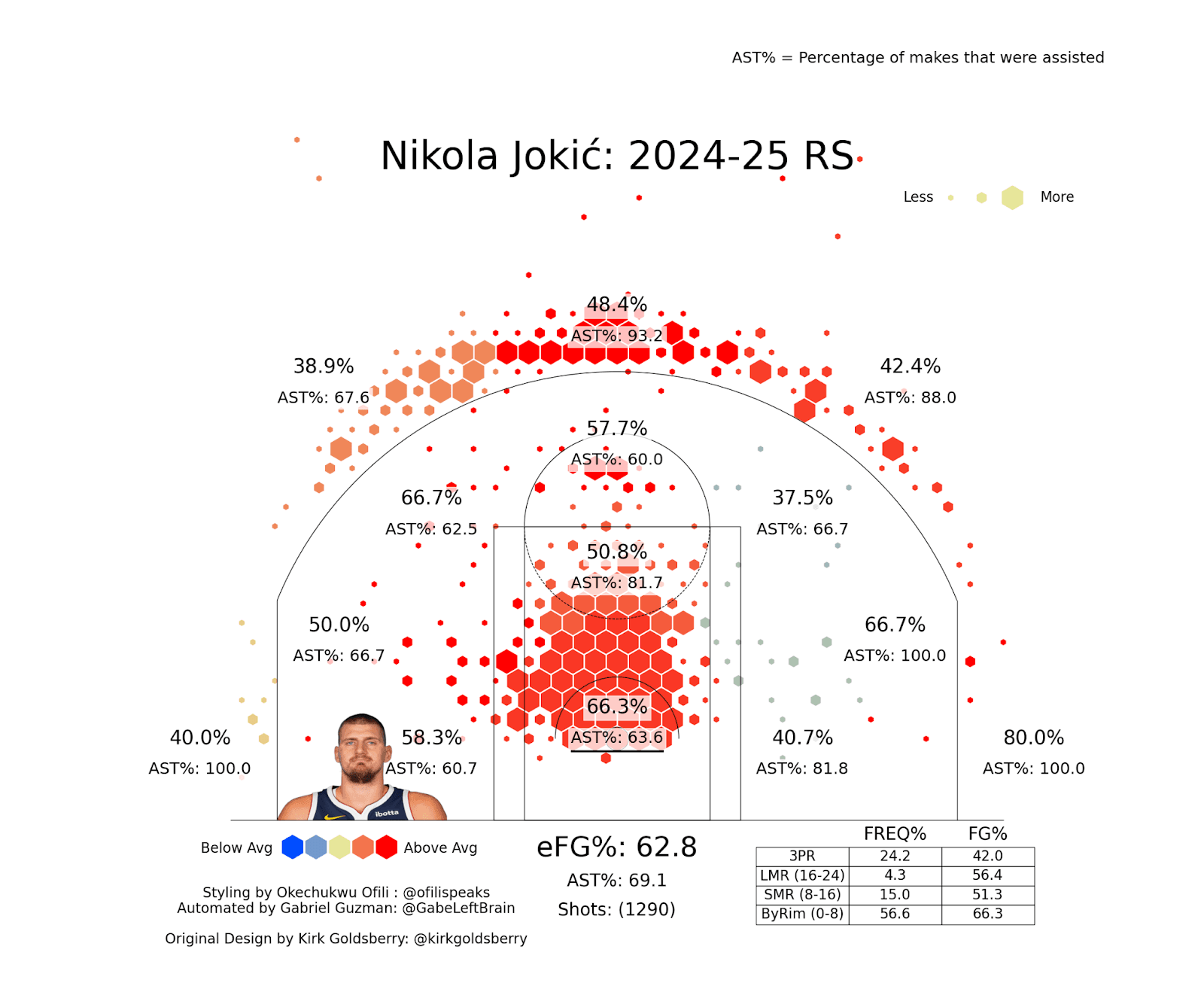
Gilgeous-Alexander comes closer to Jokic’s MVP case than anyone has, including, in my opinion, Joel Embiid when he won in 2023. SGA is art plus maximum output on one of the most dominant regular-season teams ever assembled, an illusionist with more “How the hell did he make that?” shots in a season than anyone since Steph Curry won his first MVP. The rules of geometry do not apply here. He leads the league in points, made free throws, win shares, and, meaningfully, estimated plus-minus. Besides ranking first in drives by a few hundred, he’s also first in points per chance out of 50 players who’ve driven the ball at least 500 times this season, per Sportradar. His raw plus-minus numbers are silly. Gilgeous-Alexander’s plus-911 not only leads the league but is also 372 points better than anyone else who doesn’t play for the Thunder, and he has the fifth-highest margin since plus-minus was first tracked back in 1997.
There’s nothing negative to say about him, but when we’re honoring an individual’s effect within a team sport, I don’t care that much about historical precedents and try to avoid being too simple about it. Wins and losses matter, yes. But, to me, they’re less important than the contextual value each individual player contributes to his respective team. Every season deserves to be judged on its own merit, too.
And if you’re looking at his relative value—that is, what might happen if OKC suddenly didn’t have access to that unbelievable production—SGA is also on the deepest roster in the league, surrounded by several strong candidates to make an All-Defensive team. The Thunder outscore opponents by 2.9 points per 100 possessions when Shai is on the bench—for the sake of comparison, Denver’s overall net rating this season is plus-3.6 and ranks ninth—largely because OKC’s defense, when he sits, is still the best in the NBA by a significant amount. Several of SGA’s teammates also have a higher effective field goal percentage when he’s off the court, which isn’t an indictment of his game so much as praise for the talent around him.
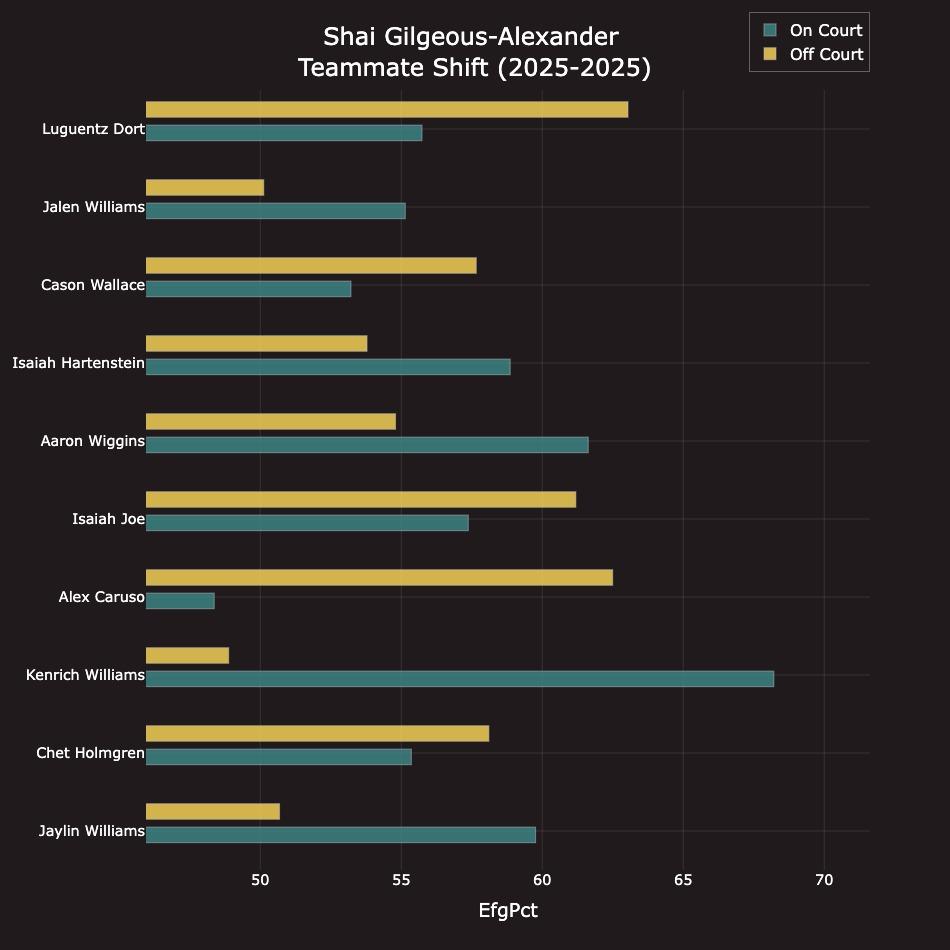
Some fans, analysts, and voters might believe that being an unstoppable scoring champ whose team flirted with a 70-win pace is an ironclad argument for MVP. Fair! I just think that when you calibrate Jokic’s decisiveness, efficiency, mind-boggling counting stats, and positive impact on everyone around him, it’s hard to suggest that anyone else holds more importance with their respective team.
Jokic might be the strongest connective tissue in NBA history. Everyone is involved when they share the floor with him, which is why everyone is willing to buy in and fill the role that makes the most sense for the team. None are All-Stars, yet of the 247 three-man lineup combinations that have played at least 500 minutes this season, the six best (SIX BEST!) offensive ratings have Jokic in them.
With Jokic on the floor, Denver’s offense is the most efficient of all time (for people who care about this, it also ranks dead last in 3-point rate), and when he sits, it tumbles to a mark that’s several points below that of the 30th-ranked Washington Wizards. When Jamal Murray and Michael Porter Jr. share the court without Jokic, the Nuggets’ net rating is minus-2.8. His value is simply off the charts.
It's certainly fair to contend that SGA's defense is better than Jokic’s, but I have a hard time comparing Jokic and Gilgeous-Alexander because their roles and responsibilities are so dramatically different on that end. SGA is inarguably good but never has to check one of the other team’s primary options along the perimeter; he can gamble for steals without much consequence. The pieces around him are that good.
Jokic is a poor rim protector who is constantly challenged in the pick-and-roll on the 20th-ranked defense in the league. But he’s also smart, is handsy, is rarely out of position, doesn’t foul, and is one of basketball’s best defensive rebounders.
After those two on my ballot, Tatum and Antetokounmpo are super close for no. 3. Statistically, whether we’re looking at basic numbers or advanced metrics, most categories go to Antetokounmpo. If you care more about steady production from the best player on a title contender who rarely misses any games and has no meaningful weaknesses, there’s Tatum.
I do think that Milwaukee’s precarious situation is, to a certain extent, the fault of Antetokounmpo, whose public pressure campaign—and offensive shortcomings—led to the Damian Lillard trade and the loss of Jrue Holiday to the Celtics. The cost-cutting measures that ensued this season help explain why Kyle Kuzma and Kevin Porter Jr. are now in Doc Rivers’s rotation. Tatum, on the other hand, is no-nonsense, doesn’t complain, and might be the easiest to build around of any foundational superstar. I ultimately went with Antetokounmpo by a hair because 30/12/6, the league’s highest usage rate, and about 200 more baskets in the restricted area than anybody else seems like a big deal.
The fifth spot has several worthy candidates. I went with Cunningham over Jalen Brunson and Donovan Mitchell because, even though he trails them in multiple catchall stats, is less efficient, and has a much higher turnover rate, the fact that the Detroit Pistons are in contention for home-court advantage in the NBA playoffs is the most shocking development in the league. And it wouldn’t have been possible without Cunningham’s ability to manufacture quality offense while carrying one of the heaviest loads in the NBA. He ranks second in on-ball percentage and third in true usage rate, and only Trae Young has run more pick-and-rolls—plus, he’s a solid, if not good, all-around defender whose best teammate (Malik Beasley) has come off the bench for most of the season.
Coach of the Year
- J.B. Bickerstaff
- Kenny Atkinson
- Ty Lue
The race between Bickerstaff and Atkinson is such a close call. In their first year in their new jobs, both have completely shifted the trajectory of their teams, reshaped each roster’s identity, and effectively instilled principles that required buy-in and sacrifice.
I ultimately went with Bickerstaff. The Pistons made the NBA’s most notable improvement in net rating this year, leaping from minus-9.0 to plus-2.3 points per 100 possessions. Yes, the team’s personnel changed. But Detroit’s most notable offseason additions were flawed journeymen. Jaden Ivey’s broken leg could’ve capsized the season, too. Instead, largely thanks to the defense-first DNA that was established by Bickerstaff, it didn’t.
I also just think that the amount of credit Atkinson gets for taking what was essentially the same core Bickerstaff had in Cleveland, then building on so many winning habits that had already been instilled within the organization, is kind of a feather in J.B.’s cap, too. Clearly Bickerstaff is a very good coach, and, also clearly, when healthy, the Cavaliers are an awesome team. (Two years ago, they won 51 games and finished second in net rating.)
The Steve Kerr–Mark Jackson parallel is popular, but Jackson never coached again, while Bickerstaff immediately went to another team and literally became my pick for Coach of the Year. This isn’t to discredit the splash of ingenuity that Atkinson dropped on a stale offense or the fact that he convinced Mitchell to sacrifice more touches than basically every other player in the league in an effort to enable Evan Mobley’s ascension. The Cavaliers are the best team in the Eastern Conference because of all that and more. But the link between Atkinson and his predecessor is worth mentioning.
It was also a coin flip between Lue and Ime Udoka for the third spot, but in keeping with the spirit of this award—who exceeded preseason expectations and overcame the biggest obstacles—it’s hard not to give an immense amount of credit to Lue (and new defensive coordinator Jeff Van Gundy) for finding the right identity for the Clippers, who were projected by most to finish in the lottery before Kawhi Leonard’s status for the regular season was known. On January 4, the day Leonard made his season debut, L.A. was 20-15 and tied for the 6-seed. Wild.
Rookie of the Year
- Stephon Castle
- Zaccharie Risacher
- Jaylen Wells
With all due respect, how many people would care if we gave the 2025 Rookie of the Year race a breather? As the season went on, I found it harder and harder to identify whose statistical production mattered in any competitive sense. But since someone has to win, I chose Castle, whose inefficiency (his field goal percentage from just about every spot on the court is below league average) seemed less meaningful to me than all the areas of his game—on-ball defense, shot creation, drawing fouls—that are several years ahead of schedule.
He’s also had the best counting stats, the highest usage, and the most two-way responsibility on a Spurs team that was in the playoff hunt before its franchise player was ruled out for the season. Risacher and Wells have been in the starting lineup for two teams that are likely to make the playoffs. Their numbers are OK, and they’re relatively efficient. The no. 1 pick has played in only 11 of Atlanta’s 41 crunch-time games, though. Relatively diminished roles hurt them a bit; neither was asked to do much with the ball in his hands.
First-Team All-Rookie
Stephon Castle
Zaccharie Risacher
Jaylen Wells
Zach Edey
Matas Buzelis
Second-Team All-Rookie
Isaiah Collier
Alex Sarr
Kel’el Ware
Ron Holland
Yves Missi
Defensive Player of the Year
- Dyson Daniels
- Evan Mobley
- Jaren Jackson Jr.
Once we learned that Victor Wembanyama would miss the rest of this season and be ineligible for any end-of-season awards, I made a short list of replacement candidates for Defensive Player of the Year. No immediate front-runners popped out. A few months later, the race seems as wide-open now as it did then, with so many different roles, responsibilities, and positions all jumbled together in an apples vs. oranges debate that, sans Wemby, feels entirely subjective.
I chose Daniels because, in a historic breakout season that came out of nowhere and doesn’t feel properly appreciated because it happened out of the national spotlight on the Hawks, who will finish with a below-average defense, he’s had one of the most disruptive seasons on the perimeter that we’ve ever seen. Daniels was a revelation in October and then played pretty much the same all season long. That matters.
Let’s start with the ridiculousness. There are only eight players who’ve finished a season averaging more steals than the 3.0 swipes Daniels gets per game, a mark that was last topped by John Stockton in 1989 (Daniels was born in 2003). His 222 total steals is 90 more than any other player has had this season. Whether he’s ripping it out of someone’s hands, creeping behind them to poke it away, or playing free safety and intercepting an errant pass, Daniels has been putting on a tour de force defensively this season.
Where things get even more silly is the deflections. Since this stat was tracked, here are the league leaders from every season that was 82 games long:
- 2016-17: John Wall, 304
- 2017-18: Robert Covington, 315
- 2018-19: Paul George, 292
- 2021-22: Dejounte Murray, 271
- 2022-23: Fred VanVleet, 262
- 2023-24: De’Aaron Fox, 270
The Great Barrier Thief averages about six per game—Alex Caruso led the NBA last year with 3.8—while tallying a grand total of 427! The gap between Daniels and the current runner-up in that category, Keon Ellis, is the same as the distance between second and 150th. Yes. You read that sentence correctly.
Daniels has also recovered the second-most loose balls and is third in the league in closeouts. He doesn’t flop and is hardly ever in foul trouble. The impact all this has on the possession game is significant. Atlanta attempts 89 shots per 100 possessions with Daniels on the court and just 84.4 when he’s on the bench.
His job, every single night, is the hardest one in the game: Go check the other team’s best player. From big forwards like Jayson Tatum and LeBron James to shifty point guards like Steph Curry and Jalen Brunson and relentless assassins like Shai Gilgeous-Alexander and Anthony Edwards. All excel as offensive engines that function in different ways. All were Dyson’s primary assignments.
He ranks in the 100th percentile in matchup difficulty and guarded usage percentage, and he has terrific balance, size, length, endurance, reflexes, and instincts. Modern stars don’t care about who’s directly in front of them so much as what their help behind the play is doing. Against Daniels, stars very much indeed care about who’s directly in front of them.
One-on-one, he is less “pest” than “total infestation that requires a state-of-the-art fumigation system.” There are 54 players who’ve guarded at least 100 isolation plays without help from a second defender this season, and only two of them have allowed fewer points per chance than Daniels.
Even though he’s contributing to a defense that’s allowed 3.0 fewer points per 100 possessions when he’s off the court, Daniels ranks third in defensive estimated plus-minus among all guards and fifth overall out of everyone who plays at least 30 minutes per game. There are several potential explanations for that disconnect. One is that 73 percent of all of Daniels’s minutes this season have come with Trae Young on the floor. Young has been, by any measure, one of the league’s worst defenders since he entered the NBA; someone like Lu Dort doesn’t have to worry about situations like this one:
Injuries to Jalen Johnson and Clint Capela did not help, either. And neither did trading away De’Andre Hunter (who’s OK by himself but a lot better than Georges Niang and Caris LeVert) or starting a 19-year-old rookie in Risacher. Dig deeper into the numbers, and the Hawks also have some bad luck and wonky shotmaking. From the floater zone—outside the restricted area but inside the free throw line—opponents have been lights out this season when Daniels is on the court and not that great when he’s off it. That differential is by far the worst on his team, which … good luck to anyone who tries to understand why!
For his part, Daniels is elite at deterring shots. According to Sportradar, as the primary defender, he’s deterred the second-most shots while defending a ball screen and the third most while defending a drive. Watch this play below; Daniels stifles Lillard and Antetokounmpo’s two-man game on a possession in which they try to screen him off Dame three times (!):
Daniels is not perfect, and, as is the case for most defenders who gamble for a ton of steals, sometimes he leaves his teammates vulnerable by veering out of position. But when you’re so much better than everyone else at something that consistently makes the offense second-guess itself, that matters.
Most voters will likely go with a big man as the winner here, and that makes plenty of sense. Mobley, Draymond Green, and Jackson have all been excellent in their respective roles on and off the ball, protecting the paint and anchoring defenses that look, feel, and are so much worse when they aren’t in the game. I just decided to go with someone who, I think, dealt with (and did an incredible job managing) harsher circumstances each night.
First-Team All-Defense
Dyson Daniels
Evan Mobley
Amen Thompson
Draymond Green
Jaren Jackson Jr.
Second-Team All-Defense
Kris Dunn
Rudy Gobert
Jalen Williams
Lu Dort
Toumani Camara
And just for fun, here is an imaginary third team that, honestly, we need and deserve. With so many worthy defenders available to choose from, there’s simply no way to rationalize the 10-player cutoff!
“Third-Team” All-Defense
OG Anunoby
Jaden McDaniels
Bam Adebayo
Derrick White
Andrew Nembhard
Most Improved Player
(A quick disclaimer: With sincere apologies to Daniels, Christian Braun, and the Thompson twins, I consider only players who already have at least three seasons under their belt. Young players are supposed to get better!)
- Ty Jerome
- Ivica Zubac
- Cade Cunningham
According to Bball Index, here’s a list of every player whose shot quality in the half court is lower than Jerome’s this season (minimum 1,250 minutes): DeMar DeRozan, Anfernee Simons, Cunningham, Jaren Jackson Jr., and LaMelo Ball. Now, of the 42 players who rank below the 20th percentile in half-court shot quality, here’s a list of everyone who has a higher effective field goal percentage than Jerome: Nobody.
What does this mean? Jerome’s season makes absolutely zero sense! Now on his fourth team in six years—and he was a G League journeyman for large chunks of that stretch!—Jerome not only came out of nowhere to become one of the most efficient bench scorers in the NBA but also did it with a significant degree of difficulty, on the title-contending Cavaliers. It’s absolutely mind-blowing.
Entering this season, the 27-year-old’s career true shooting percentage was 53.5. This year, it’s jumped to 63.8, and he’s scored the fifth-most points for the NBA’s best offense. Nobody (I repeat, nobody!) saw any of this coming, a jump from barely hanging around the NBA to, now, life as potentially one of the most sought-after unrestricted free agents in the entire league this summer.
The next candidate’s leap was more foreseeable but no less meaningful. Zubac had no choice but to step up and fill a massive void left by Paul George this season: More minutes, more touches, more shots, more decisions, and a much smaller margin for error on both sides of the ball.
Right beside Norm Powell (who would be on this list if he had played more games), Zubac answered the bell. He’s also a legitimate candidate for Defensive Player of the Year who’s gobbled up more rebounds than anybody else. And even though he’s played 6.1 more minutes per game this season, he’s somehow averaging his fewest fouls since he was on the Lakers. That’s not nothing. The Clippers have not had a reliable backup center all year—which helps explain why Zubac has one of the best on-off point differentials in the league—and would have to fundamentally change how they play if he went down for a significant stretch.
The 28-year-old’s assist rate is up, his turnover rate is down, and he’s seen his number of post-ups double without any significant drop in efficiency. Only six veterans rank higher in daily plus-minus improvement. A lot of people deserve credit for the Clippers’ success this season. Zubac is at or near the top of that list.
To be honest, the pack of candidates who meet my and the league’s standard for qualification is pretty weak. Cunningham gets the nod at no. 3 here by default. I do think he’s better this year but also think he was pretty awesome last year, and he has made the typical strides any growing former top pick whose team decided to stop playing double-big lineups should. Kudos to him, though, for going from the face of an NBA laughingstock to a lock for All-NBA and serious contender on multiple MVP ballots.
Sixth Man of the Year
- Payton Pritchard
- Malik Beasley
- Ty Jerome
Pritchard leads all bench players in total points, 3s, and plus-minus, while ranking third in assists and 10th in offensive rebounds for one of the best teams in the NBA. He basically never turns the ball over, spaces the floor, creates efficient shots for himself and others, and, at 6-foot-1, is a plus defender at his position.
Pritchard doesn’t just fire away from the outside, either. He takes advantage of all the space his teammates provide when defenders run him off the line, putting pressure on the paint, forcing rotations, and either kicking out to the weakside corner or directly punishing defenses that underestimate how effective he can be as a scorer around the basket:
Pritchard’s consistency and statistical profile give him a leg up on other candidates for this award, while his ballhandling separates him as an offensive weapon. This is a point guard who can run a highly efficient offense when the duty calls. He reads coverages and makes quick decisions off a live dribble, constantly moving, shifting, spinning, and giving the other team something they really wish they didn’t have to worry about.
Directly compared to Beasley, it’s hard to say he hasn’t had a better season. But Detroit’s flamethrowing 2-guard has a decent case that essentially boils down to this: There have been 22 seasons in NBA history when a player has launched at least 700 3-pointers. Within them, only Steph Curry has been more accurate than Beasley. He’s always been a dangerous outside shooter, but this season, on a Pistons team that had just spent an entire season suffering from a self-induced case of claustrophobia, he’s provided more than enough breathing room.
And then there’s Jerome, who I already covered while making the case for Most Improved Player. He’s been spectacular in a slightly more tapered role for one of the best offenses we’ve ever seen. Pretty good!
Clutch Player of the Year
- Jalen Brunson
- Nikola Jokic
- Trae Young
In the last five minutes of games where the scoring margin was five points or fewer, Brunson has been hyper efficient at a ridiculous volume (44.1 usage rate and 64.7 true shooting percentage) and averaged the most points. Jokic functions in that stretch at 0.25 speed while everyone else is on 2x; Denver’s offensive rating in crunch time has been nearly 130 points per 100 possessions with Jokic on the court, a sentence that made the words “SYSTEM OVERLOAD” flash in big red letters on my laptop when I first tried typing them out.
To be honest, there weren’t too many strong candidates for third place, but we’ll go with Young, who has the second-most total points and the most crunchtime assists.
First-Team All-NBA
Nikola Jokic
Shai Gilgeous-Alexander
Jayson Tatum
Giannis Antetokounmpo
Donovan Mitchell
The first four names here are pretty straightforward and should be unanimous selections. The last spot came down to Brunson, Edwards, and Mitchell, who, as the best player on a team that has shredded pretty much everything in its path for most of the season with an offense nobody can stop, got the nod. It’s been mentioned ad nauseam as a season-defining development for the Cavaliers, but Mitchell’s willingness to sacrifice individual statistics so several of his teammates could shine deserves a ton of credit. I’m not sure how replicable it is around the league (Mitchell wouldn’t take a step back if someone like Evan Mobley weren’t ready to take a step forward) but should be honored.
Second-Team All-NBA
Jalen Brunson
Evan Mobley
Karl-Anthony Towns
Anthony Edwards
Cade Cunningham
Cunningham is on my MVP ballot, plus he’s had the third-highest true usage rate in the league and, despite a relatively low true shooting percentage, has been a catalyzing force of nature who’s helped spark one of the most stunning year-to-year team turnarounds in recent memory.
Mobley has had the highest plus-minus for any player in the league outside Oklahoma and Colorado, might win Defensive Player of the Year, and has made myriad monumental strides with the ball as a key part of the league’s most potent offense. Brunson and KAT were All-Star starters who, when healthy, consistently produced for a formidable albeit paper-thin Knicks team.
Ant has completely altered his shot diet, led the NBA in 3s (not nothing!), and had to navigate a preseason trade that shipped away his only All-Star teammate at the dawn of training camp. Great year, even if at times it felt disappointing compared to the volcanic eruption we all saw during last year’s playoffs.
Third-Team All-NBA
Steph Curry
Jalen Williams
LeBron James
Jaren Jackson Jr.
Alperen Sengun
Steph and LeBron. I mean … how are they still doing this?
JDub was the second All-Star on a historically great team that triumphed in spite of some early-season injuries to its frontcourt because he became Dikembe Mutombo for a few weeks. He’s so special. Jackson will crack most DPOY ballots, so far making 40 percent of his spot-up 3s, and unleashing a floater that is going in 55.6 percent of the time. Nobody has had an answer for it; only Trae Young has attempted more of them this season. Sengun is the best player on the second-best team in the Western Conference. A foul magnet and low-post savant, his offense is spellbinding, singular, and frustrating, but it’s the defensive growth that’s allowed Houston to win as many games as it did.
And no shade to Kevin Durant, who was awesome and had a deserving statistical profile. But I can't bring myself to reward anyone who played for the Phoenix Suns this year.
My imaginary fourth-team All-NBA that solely consists of players who didn’t appear in enough games to officially qualify for the first three is absolutely loaded and would give the first team a run for its money: Victor Wembanyama, Luka Doncic, Kawhi Leonard, Anthony Davis, and either Damian Lillard or the version of Jimmy Butler who actually cares.
Statistics are updated as of Monday night.
